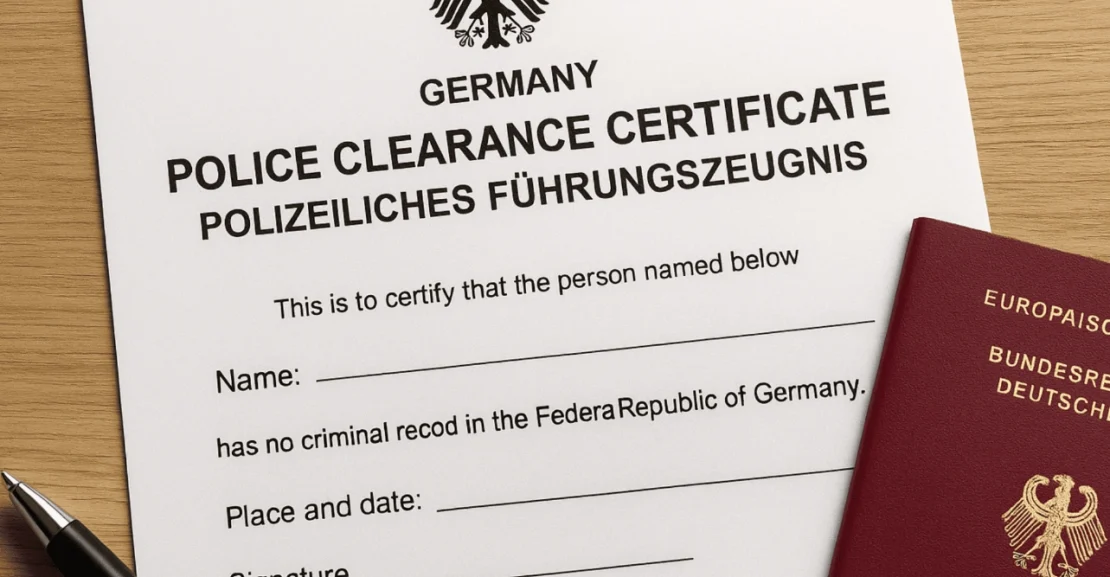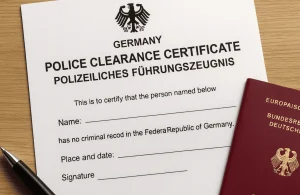Suppose you plan to apply for a visa, job, or residency in Germany or abroad. In that case, chances are you’ll be asked to submit a German Police Certificate, officially known as the Führungszeugnis or Certificate of Good Conduct. This important document, issued by the Federal Office of Justice (Bundesamt für Justiz), provides proof of whether you have a criminal record in Germany.
But one question always comes up: how long does it take to get a German police certificate? The answer depends on where you’re applying from, the type of certificate you need, and whether it will be used inside or outside Germany. Let’s break it all down.
What Exactly Is a German Police Certificate?
The Führungszeugnis is an official statement of your criminal record status, taken from Germany’s Federal Central Criminal Register. It’s commonly required when applying for jobs, residence permits, citizenship, or academic programs, and sometimes for visa or immigration purposes abroad.
There are several types of police certificates available, depending on what you need them for. The standard certificate is typically used for personal or official matters within Germany, such as employment verification.
The certificate for use abroad is issued when the document is meant to be presented to foreign authorities or institutions, such as embassies or international employers.
In addition, there is the European Certificate of Good Conduct, designed for citizens of other European Union countries. This version includes both the applicant’s German criminal record and data obtained from their home country, which makes it more comprehensive but also lengthens processing time.
How Long Does a German Police Certificate Take?
1. Applying for a Police Certificate Within Germany
If you’re currently in Germany, obtaining your Führungszeugnis is relatively straightforward and can be done either online or in person.
The online application is by far the quickest and most convenient method. You can apply through the official website of Führungszeugnis using your German electronic ID (eID) or an electronic residence permit.
Once the application is submitted, it’s typically processed and delivered within two to three weeks. You can choose to have the certificate sent to your home address or directly to a specific authority, depending on the purpose.
Alternatively, you can apply in person at your local Bürgerbüro (citizen’s office). You’ll need to bring a valid passport or ID card and pay the standard fee of €13. In some cases, you may need to notarize your signature if the certificate will be mailed elsewhere.
The in-person route takes about the same amount of time, which is roughly two to three weeks, but can vary slightly depending on local office workload.
2. Applying from Outside Germany
For applicants living outside Germany, the process takes a bit longer. You’ll need to apply directly through the Federal Office of Justice (Bundesamt für Justiz) in Bonn.
If you still have access to your German electronic ID, you can submit your application online just like a domestic applicant.
However, most people applying from abroad don’t have that option. In that case, you’ll need to download the paper application form from the official website, fill it out, and sign it before a German embassy, consulate, or local notary.
The embassy will then certify your signature, and you can mail the completed form to the Federal Office of Justice in Germany.
Processing typically takes three to six weeks, depending on the speed of international mail and how quickly your embassy or notary completes the certification. Additional time may be needed if the office has to verify personal details or cross-check documents.
It’s important to note that while the fee for the certificate itself remains €13, additional costs may apply for notarization and embassy certification, which is usually between €20 and €50, depending on the country.
How to Make International Use of Your Certificates
If your German police certificate will be submitted to a foreign institution, you might need to have it authenticated through an apostille or legalization process.
For countries that are members of the Hague Apostille Convention, an apostille confirms the document’s authenticity. This can be obtained from the Federal Office for Foreign Affairs (BfAA) and typically adds one to two weeks to the process. The cost for the apostille is €25.
If the certificate is destined for a non-Hague country, you’ll need a full legalization instead. This involves additional steps, usually validation by the German Foreign Office followed by certification from the destination country’s embassy. Because this process varies by country, it can take several extra weeks.
For those using the document within the European Union, Germany also offers an EU multilingual form option. This version is recognized across EU countries and often eliminates the need for separate legalization or translation.
READ ALSO:
- Get a Police Character Certificate Online
- Police Character Certificate
- Get Police Character Certificate from Outside Nigeria
- How Long Does it Take to Get Police Character Certificate?
- Get a Police Character Certificate in the UK?
The European Certificate of Good Conduct
If you are a citizen of another EU member state and request a police certificate from Germany, the Federal Office of Justice automatically issues a European Certificate of Good Conduct.
This document includes any criminal records from both Germany and your home country, ensuring a complete overview for cross-border purposes.
Because it requires coordination between different national databases, the European version generally takes four to six weeks to process. While it’s slower, it provides greater credibility for employers or immigration offices across the EU.
Fees and Additional Costs for Getting a German Police Certificate
The standard fee for a German police certificate is €13, regardless of where you apply. Optional services such as an apostille, multilingual form, or express courier delivery come with additional costs.
Embassy or consular notarization fees vary depending on the country but usually fall within €20 to €50.
Some applicants may qualify for fee exemptions, especially those volunteering for public service or facing financial hardship. Always check the latest guidelines on the official website before applying.
Tips for a Smooth and Faster Application
- Apply early. Start the process at least one month before you need the certificate, especially if you’re abroad.
- Use the online portal whenever possible to avoid postal delays.
- Confirm your document type, as some institutions require the “for use abroad” version or one with an apostille.
- Keep copies of your application, receipts, and any communication with the authorities.
- Check validity periods. Most employers or embassies accept certificates issued within the last three to six months only.



